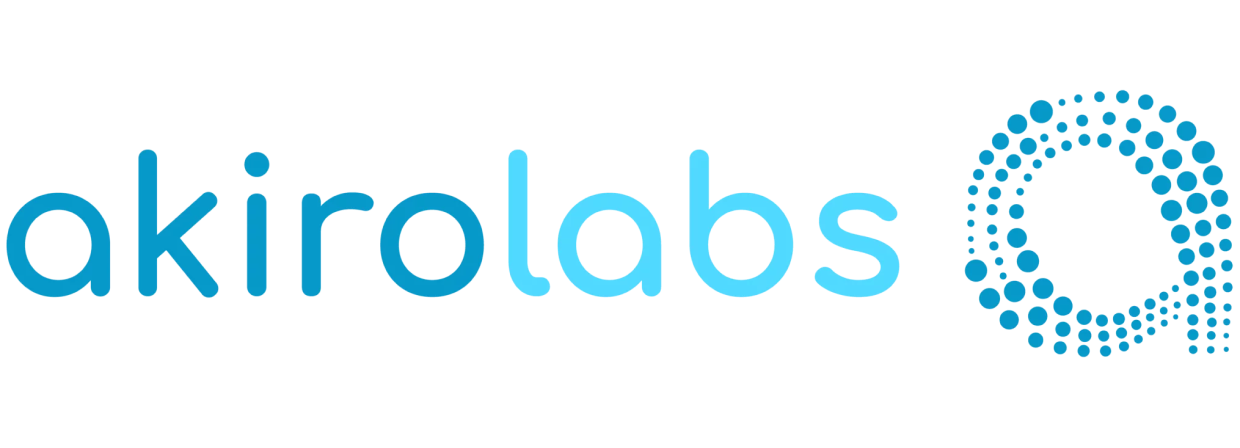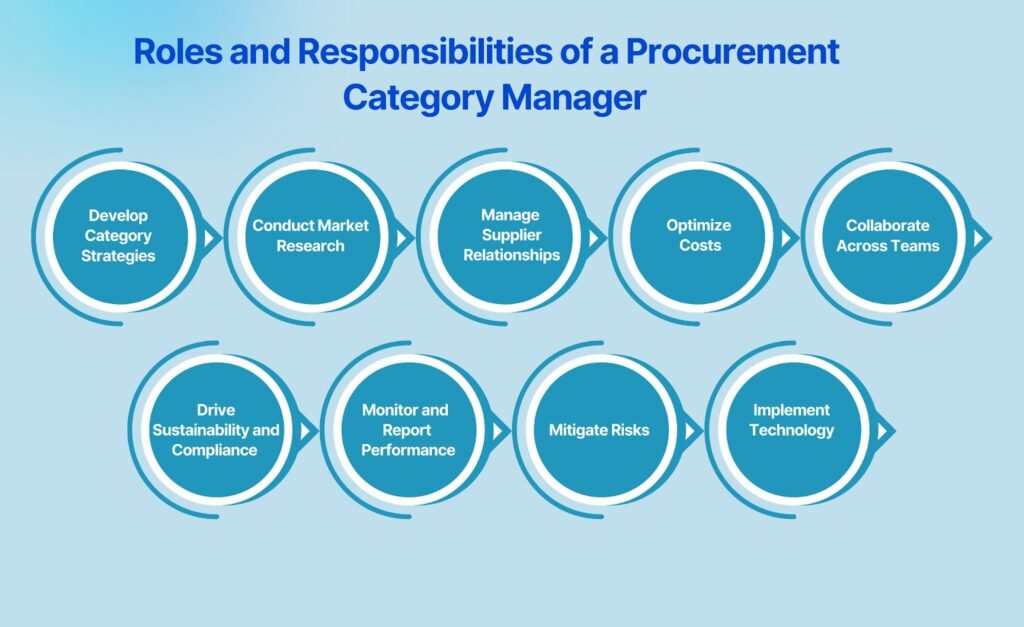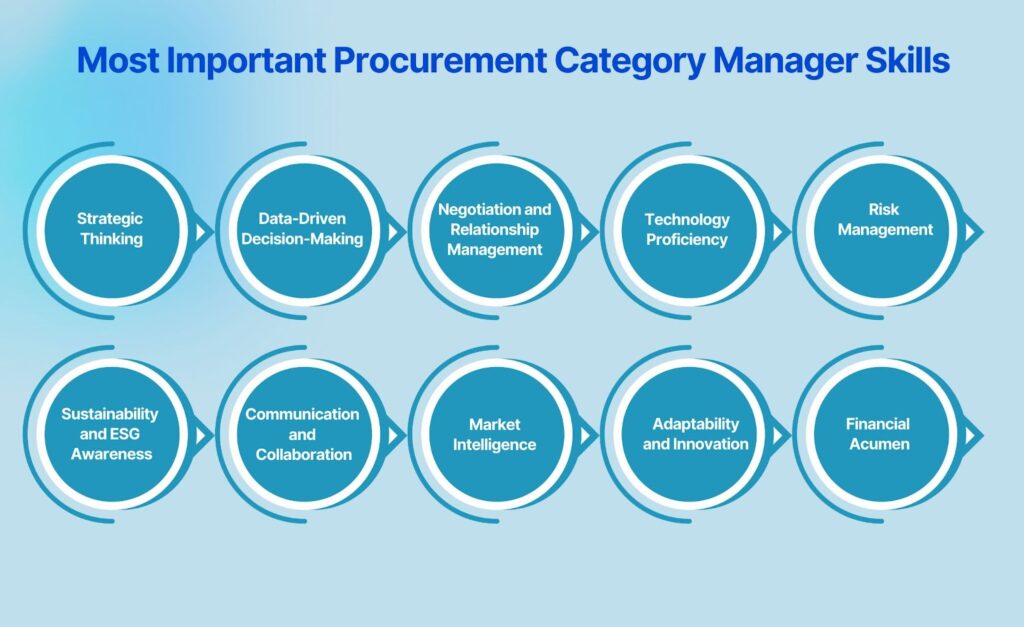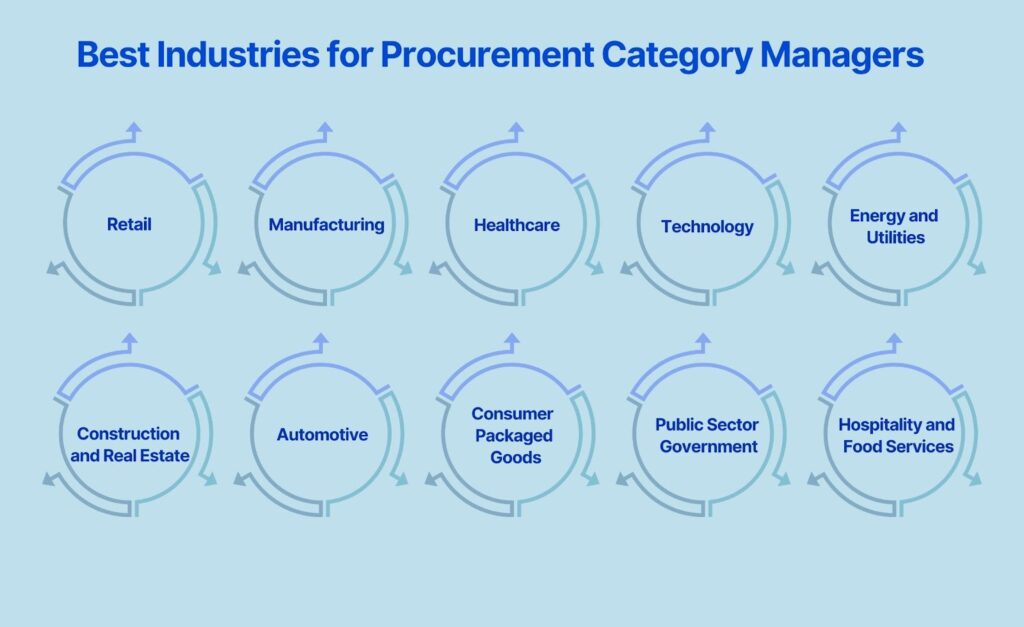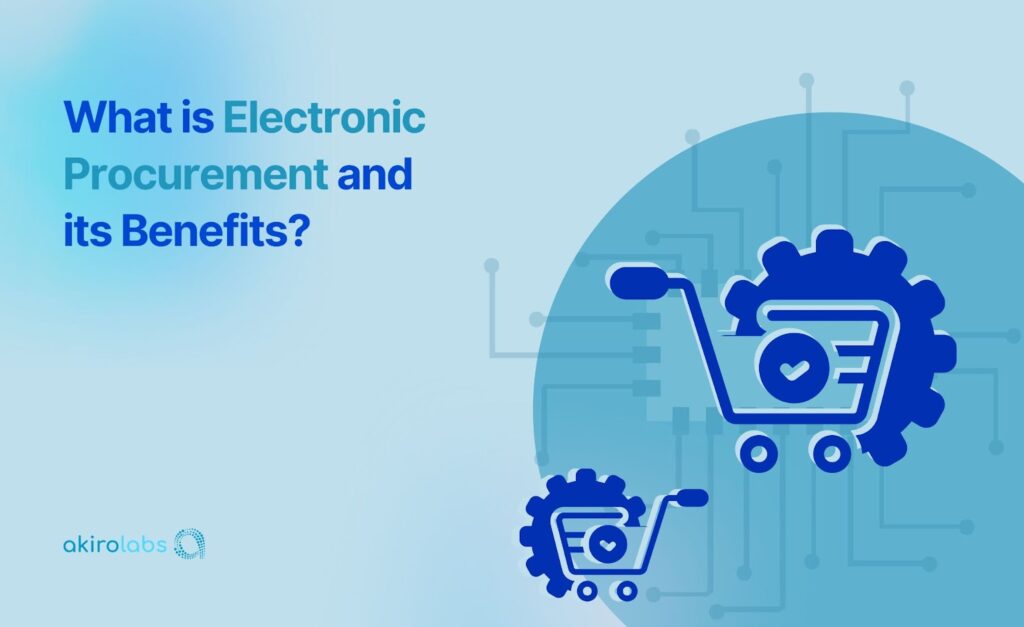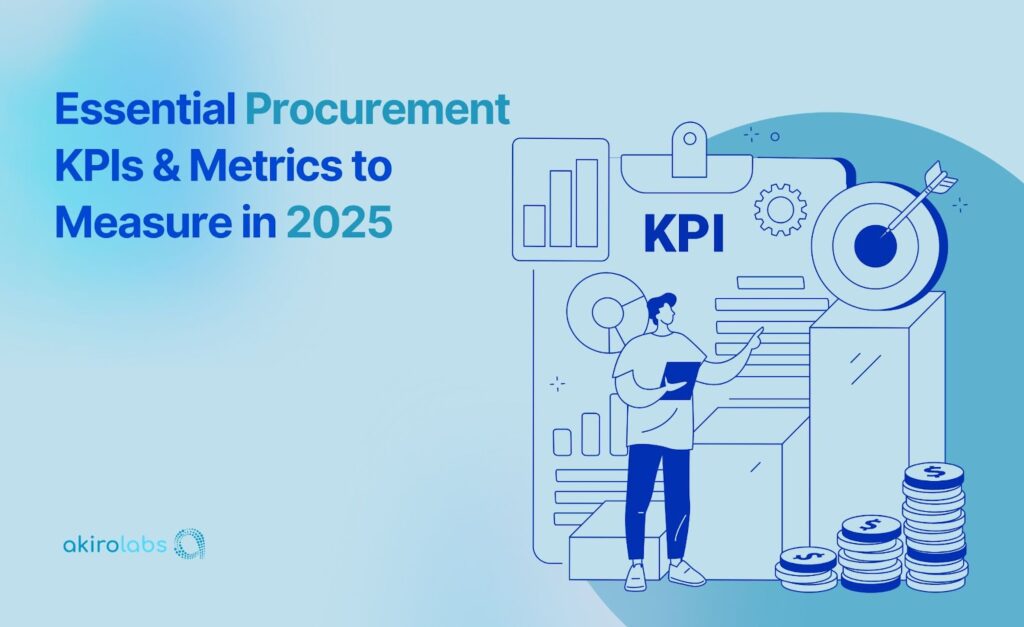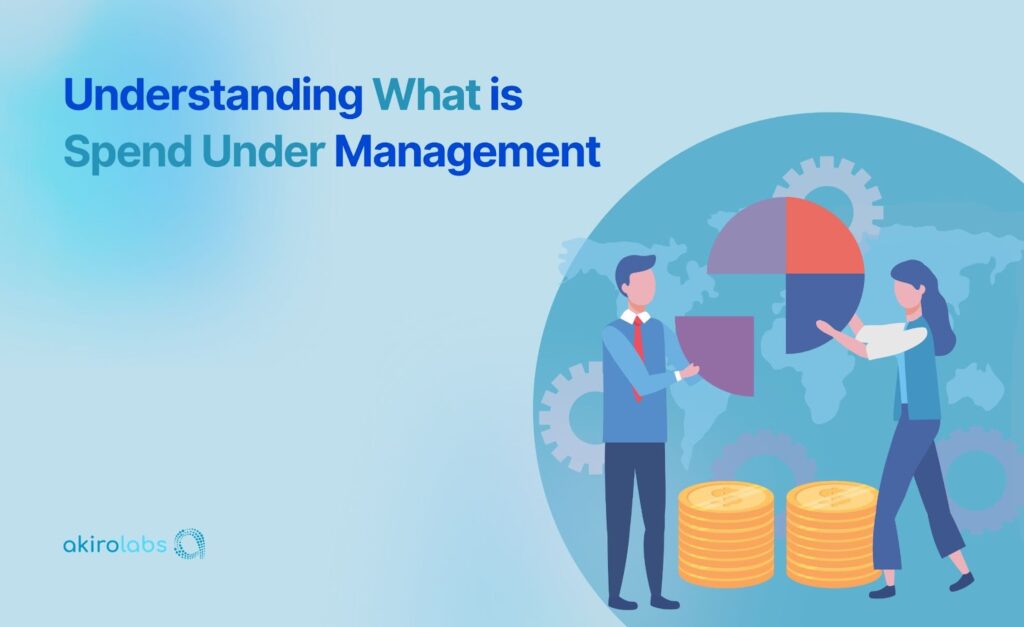For large enterprises and mid-sized businesses, managing procurement categories is no small task. With complex supply chain operations, rising cost pressures, and the need to stay competitive in a global market, procurement management challenges are more demanding than ever. Balancing efficiency, supplier performance, and strategic alignment often feels like a constant uphill battle.
As a category procurement manager, your role is more than just checking boxes; it’s about turning procurement into a strategic asset for your organization. By mastering your daily responsibilities and sharpening your skills, you can create a meaningful impact and stay ahead in this fast-paced field.
In this guide, you’ll discover the key roles you need to focus on and the skills that will take your expertise to the next level.
Who is a Category Procurement Manager?
A category procurement manager is a strategic professional entrusted with overseeing and optimizing the procurement process for specific categories of goods or services within an organization. Their role is integral to achieving cost efficiency, maintaining quality, and fostering innovation—all while ensuring alignment with the company’s overarching objectives.
Category managers are responsible for developing and implementing procurement strategies tailored to their category. These strategies must align with the organization’s business goals, such as cost reduction, sustainability, or market competitiveness. They conduct thorough category assessments, analyzing historical data, spend patterns, and market opportunities to build robust plans.
A deep understanding of market dynamics is essential. Managers track industry trends, supplier landscapes, and technological advancements to identify opportunities and mitigate risks. This knowledge enables them to anticipate market fluctuations, negotiate favorable terms, and secure a competitive edge.
Beyond reducing costs, category managers focus on delivering long-term value. They analyze total cost of ownership (TCO) and seek opportunities for savings through supplier consolidation, process efficiencies, or innovative procurement models. Their goal is to maximize returns while balancing quality and sustainability.
These professionals act as the bridge between procurement and other departments, such as finance, operations, and R&D. By understanding the needs of internal stakeholders, they ensure the procurement strategy delivers tangible value across the organization.
Now that we know about category procurement managers, let us look at their roles and responsibilities.
Roles and Responsibilities of a Procurement Category Manager
A Procurement Category Manager plays a crucial role in driving strategic sourcing, optimizing supply chain operations, and ensuring cost efficiency.
Here’s an overview of their core responsibilities:
1. Develop and Implement Category Strategies
You analyze business needs and market trends to create tailored strategies for each procurement category. These strategies align with organizational goals, ensuring cost-efficiency, quality, and supplier innovation. You take full ownership of these strategies, making sure they remain adaptable to market changes and future needs.
2. Conduct Market Research
Staying ahead of market trends is critical. You monitor supplier markets, evaluate risks, and identify new opportunities to improve procurement outcomes. You anticipate potential changes—such as supply chain disruptions or market shifts—and create strategies that can adapt to uncertainties.
3. Align Procurement with Business Goals
You act as a strategic partner who understands organizational priorities and ensures procurement decisions align with overall business goals. By working closely with stakeholders, you identify opportunities for growth, efficiency, and innovation. Your role is to align procurement strategies with measurable business outcomes, ensuring all initiatives actively create value.
4. Manage Supplier Relationships
Building and maintaining strong supplier relationships is a core part of your role. You negotiate contracts, assess supplier performance, and ensure that partnerships align with long-term business objectives. You look beyond cost savings to identify opportunities that add both tangible (cost, efficiency) and intangible value (innovation, risk reduction).
5. Optimize Costs Without Sacrificing Quality
You’re tasked with balancing cost savings and quality. You maximize value for your organization through effective negotiation, value analysis, and alternative sourcing.
6. Collaborate Across Teams
Procurement doesn’t operate in a vacuum. You work closely with stakeholders from various departments, ensuring procurement strategies meet operational, financial, and sustainability goals.
7. Drive Sustainability and Compliance
Modern procurement involves integrating sustainability into sourcing strategies. You ensure that suppliers meet ethical standards and comply with regulatory requirements, contributing to your organization’s ESG goals.
8. Monitor and Report Performance
As a Category Procurement Manager, you monitor category performance using key metrics such as cost savings, supplier delivery timelines, and quality benchmarks. This continuous tracking allows you to identify areas for improvement and refine procurement strategies. A data-driven approach not only demonstrates the value of procurement initiatives but also ensures alignment with business objectives and stakeholder expectations.
9. Mitigate Risks
Risk management is a critical responsibility, requiring proactive identification of potential challenges such as supply chain disruptions, regulatory changes, or geopolitical issues. By implementing risk assessment frameworks, you safeguard the organization from vulnerabilities that could impact operations. Effective risk mitigation ensures business continuity, protects financial interests, and builds resilience in procurement processes.
10. Implement Technology
Using procurement technologies such as supplier management systems, data analytics platforms, and e-sourcing tools is essential for modern category management. These tools enhance efficiency by automating repetitive tasks, improving supplier collaboration, and enabling real-time decision-making. The integration of technology empowers procurement teams to focus on strategic priorities and gain insights that drive competitive advantage.
To succeed in this evolving role, you need to continually develop new skills. From advanced negotiation techniques to mastering procurement technology, ongoing learning helps you stay relevant and innovative in this complex field.
In addition, it is crucial to understand how modern technologies like Artificial Intelligence (AI) are revolutionizing category management. AI bridges the gap between data and decision-making, enabling managers to analyze large volumes of procurement data in real-time, uncover trends, and forecast future market conditions. By automating routine tasks such as spend analysis, supplier selection, and contract management, AI allows category managers to focus on strategic initiatives like building stronger supplier relationships or innovating procurement processes.
AI-driven insights also enhance risk mitigation and help identify cost-saving opportunities, making category managers more agile and efficient in their roles. Embracing these technologies not only improves day-to-day operations but also ensures that category managers are better equipped to drive long-term business success in a highly competitive environment.
Now that we know about the roles and responsibilities of a procurement category manager, let us look into the skills that a category manager should possess.
Most Important Procurement Category Manager Skills
Everyone needs to continuously upskill themselves. The same is the case for procurement managers. The skills required to excel as a category manager are changing. If you have to stay ahead, you need to master a combination of technical expertise, strategic thinking, and adaptability.
Category managers of the future are no longer just procurement specialists; they are business value hunters who seek opportunities to maximize organizational value. By driving cost efficiency, enhancing supplier relationships, and fostering innovation, they contribute directly to the company’s growth. Their ability to align category strategies with broader business objectives makes them essential drivers of success in a competitive market.
Here are the most critical skills you need:
1. Strategic Thinking
You need to align procurement activities with your organization’s broader goals. Strategic thinking allows you to move beyond transactional tasks and focus on long-term value creation, market positioning, and innovation.
2. Data-Driven Decision-Making
With the increasing use of procurement analytics, your ability to interpret and use data is essential. From cost modeling to supplier performance analysis, data-driven insights guide effective category strategies.
3. Negotiation and Relationship Management
Strong negotiation skills are critical for securing favorable terms and building sustainable supplier partnerships. Your ability to foster trust and collaboration while advocating for your organization’s interests is indispensable.
4. Technology Proficiency
Procurement technology is reshaping the industry. Familiarity with tools like spend analytics platforms, e-sourcing software, and supplier management systems is no longer optional. Staying updated with tools like akirolabs can boost your efficiency and decision-making capabilities.
5. Risk Management
In an era of supply chain volatility, your ability to identify, assess, and mitigate risks is vital. Proactively managing risks ensures supply continuity and shields your organization from disruptions.
6. Sustainability and ESG Awareness
Sustainability is a growing priority. You need to integrate environmental, social, and governance (ESG) criteria into your procurement decisions, balancing cost efficiency with ethical and sustainable practices.
7. Communication and Collaboration
Strong communication skills help you collaborate with stakeholders across departments and align procurement strategies with organizational needs. Being a great communicator also aids in presenting insights and securing buy-in for category strategies.
8. Market Intelligence
Understanding market trends, supplier capabilities, and competitive dynamics empowers you to make informed sourcing decisions and stay ahead in rapidly changing industries.
9. Adaptability and Innovation
In a fast-paced environment, your ability to adapt to new technologies, changing markets, and evolving organizational priorities is crucial. Staying innovative ensures that your strategies remain relevant and impactful.
10. Financial Acumen
A solid understanding of financial principles allows you to analyze budgets, assess cost drivers, and deliver measurable savings without compromising quality or value.
By cultivating these skills, you’ll position yourself as a forward-thinking procurement category manager ready to tackle all challenges. Now that we know about the skills, let us see what all industries are best for procurement category managers.
Best Industries for Procurement Category Managers
Procurement category managers play a critical role across various industries, with some sectors offering more opportunities due to their reliance on strategic sourcing and supplier management. Here are the top industries where your skills can make the greatest impact:
1. Retail
The retail industry relies heavily on category managers to manage diverse product categories, negotiate with suppliers, and optimize costs. Your ability to balance supply chain efficiency with meeting customer demands is essential in this fast-paced environment.
2. Manufacturing
Manufacturers depend on skilled procurement professionals to source raw materials, manage supplier relationships, and reduce production costs. Your expertise in category strategy and risk management ensures smooth operations and cost savings in this highly competitive industry.
3. Healthcare and Pharmaceuticals
In healthcare, procurement category managers are vital for sourcing medical supplies, equipment, and pharmaceuticals. With strict regulatory requirements and a focus on quality, your ability to negotiate contracts and maintain supplier compliance is critical.
4. Technology
The tech industry’s rapid innovation and global supplier networks demand category managers who can handle complex procurement challenges. Managing supplier partnerships, driving cost-efficiency, and sourcing cutting-edge components are key responsibilities in this sector.
5. Energy and Utilities
The energy sector requires procurement category managers to manage equipment, fuel, and maintenance services. Your focus on sustainability and cost control is especially valuable as the industry transitions toward renewable energy solutions.
6. Construction and Real Estate
Construction projects rely on efficient procurement of materials, equipment, and services. Your ability to manage budgets, evaluate suppliers, and ensure timely deliveries is essential for project success.
7. Automotive
The automotive industry’s global supply chains require category managers to source components, manage supplier relationships, and optimize logistics. Your role in ensuring quality and cost-efficiency is vital in this competitive market.
8. Consumer Packaged Goods (CPG)
In CPG, procurement category managers help source raw materials and packaging while keeping costs in check. Your skills in supplier negotiation and sustainability are valuable in an industry facing growing pressure for eco-friendly practices.
9. Public Sector and Government
Governments and public organizations rely on procurement professionals to manage large-scale contracts and ensure compliance with regulations. Your expertise in risk management and strategic sourcing can make a significant impact here.
10. Hospitality and Food Services
Hotels, restaurants, and food service companies need category managers to source ingredients, supplies, and equipment while maintaining quality standards. Your ability to manage supplier relationships and control costs is crucial in this customer-focused industry.
These industries offer exciting opportunities for procurement category managers to showcase their skills and drive value in dynamic, challenging environments. Whether you’re drawn to innovation, sustainability, or large-scale operations, there’s a sector where your expertise will shine.
Well, if that doesn’t get your wheels turning, wait until you see how akirolabs can take your procurement game up a notch!
How Can akirolabs Help Procurement Category Manager?
akirolabs helps procurement category managers by providing a comprehensive platform that addresses their key challenges and elevates their strategic capabilities. Here’s how it specifically supports them:
1. Transforming Procurement into a Strategic Function
akirolabs equips category managers with tools to move beyond operational tasks and focus on creating strategies aligned with business objectives. It enables managers to transition from cost-saving efforts to delivering higher business value.
2. Enhanced Collaboration
The platform fosters collaboration among stakeholders and cross-functional teams, breaking silos and ensuring alignment across departments. With business requirement surveys and intuitive workflows, category managers can involve stakeholders early in the process, improving buy-in by up to 90%.
3. AI-Driven Insights
With advanced AI capabilities, akirolabs provides category managers with actionable insights by integrating internal and external data. This helps them analyze market trends, supplier performance, and risks, allowing for smarter and faster decision-making.
4. Comprehensive Strategy Development
akirolabs offers a library of over 100 procurement levers, allowing category managers to develop customized strategies for their categories. These tools ensure strategies are innovative and aligned with broader organizational goals.
5. Continuous Risk Management
The platform helps category managers proactively assess and mitigate risks across supply chains. They can build resilient strategies that safeguard business operations and minimize disruptions by continuously monitoring vulnerabilities.
6. Value Tracking and Reporting
akirolabs turn strategies into actionable initiatives and provides tools to track their implementation. Category managers can compare actual outcomes with forecasts, generate clear reports, and communicate measurable results to stakeholders effectively.
7. Sustainability Integration
As sustainability becomes a priority, akirolabs allows category managers to integrate ESG (Environmental, Social, and Governance) criteria into procurement strategies. This ensures responsible sourcing and alignment with organizational sustainability goals.
8. Increased Efficiency
By automating repetitive tasks and streamlining workflows, akirolabs frees up category managers’ time, allowing them to focus on high-value strategic activities. The intuitive design ensures ease of use, reducing the time spent on administrative tasks.
9. Dynamic and Iterative Approach
Traditional linear processes often limit flexibility, but akirolabs’ dynamic and iterative framework allows category managers to adapt strategies as business needs evolve. This ensures strategies remain relevant and effective.
10. Driving a Mindset Shift
The platform promotes a mindset shift from purely tactical operations to strategic thinking. This helps category managers not just deliver on immediate goals but also contribute to long-term organizational success.
akirolabs’ category procurement manager is your all-in-one solution for driving efficiency, sustainability, and strategic alignment in procurement. With its comprehensive features and focus on delivering measurable results, it’s the tool you need to excel in category management.
Conclusion
Category procurement managers are the backbone of strategic sourcing, driving cost efficiency, innovation, and sustainable supply chain practices across industries. To excel in this role, using the right tools and technology is just as important as honing your skills.
This is where akirolabs comes in. We empower procurement professionals like you with advanced category strategy tools, enabling data-driven decision-making, seamless collaboration, and smarter sourcing. Integrating cutting-edge technology into your procurement processes, akirolabs helps transform challenges into opportunities and deliver measurable value to your organization.
akirolabs will help you stay ahead of industry trends, optimize your category management strategies, and position yourself as a leader in your field. Take your procurement expertise to the next level with akirolabs—the future of strategic category management.
